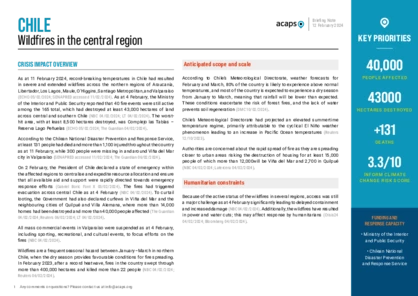Chile hosts around 498,000 Venezuelan migrants, refugees, and asylum seekers, with the highest numbers in the regions of Antofagasta, Tarapacá, and the capital Santiago. There has been an increasing trend of Venezuelans crossing into Chile since 2016, mainly because of the economic collapse in Venezuela. Chile hosts the fourth-largest population of Venezuelan migrants and refugees, after Colombia, Ecuador, and Peru.
Many migrants enter Chile at irregular border crossings, undertaking lengthy journeys on foot and in extreme weather, including conditions of the Atacama Desert. Lacking adequate clothing, blankets, water, food, and other essential supplies, the people put their health and lives at risk along the way.
Venezuelan and other migrants and refugees in Chile suffer from acts of discrimination and xenophobia, triggered by the increased pressure on resources resulting from the high number of arrivals, as well as a lack of integration policies. In the northern city of Iquique, the increasing flow of Venezuelans has led to clashes with law enforcement and the host community.
The enactment of the New Migration Bill in 2021 sought to regulate and renew immigration permits, requiring visas for Venezuelan migrants, and standardizing procedures for plural expulsions of migrants with irregular status. Venezuelans in Chile need documentation, such as permits and visas, to access services and formal jobs and improve their living conditions.
(R4V 02/12/2023, BBC 14/10/2022, Chile Atiende 08/06/2022)
Chile hosts around 498,000 Venezuelan migrants, refugees, and asylum seekers, with the highest numbers in the regions of Antofagasta, Tarapacá, and the capital Santiago. There has been an increasing trend of Venezuelans crossing into Chile since 2016, mainly because of the economic collapse in Venezuela. Chile hosts the fourth-largest population of Venezuelan migrants and refugees, after Colombia, Ecuador, and Peru.
Many migrants enter Chile at irregular border crossings, undertaking lengthy journeys on foot and in extreme weather, including conditions of the Atacama Desert. Lacking adequate clothing, blankets, water, food, and other essential supplies, the people put their health and lives at risk along the way.
Venezuelan and other migrants and refugees in Chile suffer from acts of discrimination and xenophobia, triggered by the increased pressure on resources resulting from the high number of arrivals, as well as a lack of integration policies. In the northern city of Iquique, the increasing flow of Venezuelans has led to clashes with law enforcement and the host community.
The enactment of the New Migration Bill in 2021 sought to regulate and renew immigration permits, requiring visas for Venezuelan migrants, and standardizing procedures for plural expulsions of migrants with irregular status. Venezuelans in Chile need documentation, such as permits and visas, to access services and formal jobs and improve their living conditions.
(R4V 02/12/2023, BBC 14/10/2022, Chile Atiende 08/06/2022)


